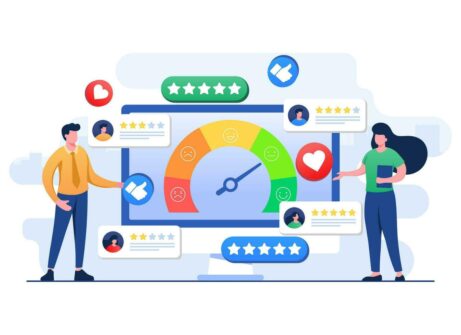Understanding your customers can be the difference between stagnation and success. As businesses strive for growth, customer insights have emerged as a powerful tool to unlock new opportunities and foster stronger connections.
Customer insights go beyond basic data; they provide a deeper understanding of consumer behaviors, preferences, and motivations. This knowledge is crucial for businesses to tailor their strategies effectively and cater to the evolving needs of their target audience.
In this article, we will explore what customer insights are, why they matter, and how to harness them for business growth. By examining various types and methods for gathering insights, we will uncover best practices that can transform your strategies and highlight how tools like LiveAgent can streamline your customer interactions to deliver effective solutions.
Table of Contents
- What are customer insights?
- Importance of customer insights in business
- Difference between customer insights and market research
- Types of customer insights
- Practical examples of customer insights
- How to Gather Customer Insights
- Effective use of customer insights
- Tools and technologies for collecting insights
- Challenges in gathering customer insights
- Best Practices for Implementing Customer Insights Strategies
- Conclusion
What are customer insights?
Customer insights come from diving deep into customer data—both qualitative and quantitative. This data reveals patterns in customer behavior, preferences, and needs. Understanding these insights allows businesses to create better products and services by truly addressing what customers want. Here’s how customer insights work:
- Customer data: Gather information like behavior patterns, personal details, preferences, and purchase history.
- Analysis: A dedicated Customer Insights team analyzes this data to spot trends and opportunities.
- Actionable intelligence: Use the insights to make informed decisions and enhance customer satisfaction.
The table below outlines key components:
| Element | Description |
|---|---|
| Qualitative Data | Customer feedback, reviews, and interviews |
| Quantitative Data | Purchase history, demographics, and web analytics |
| Actionable Insights | Suggestions for product improvements and strategies |
Businesses that harness these insights well are proven to increase profitability and attract new customers. Engaging tools like LiveAgent can enhance your ability to understand and solve customer problems efficiently. By utilizing customer insights, companies can ensure a better customer experience and stronger loyalty.
Importance of customer insights in business
Interpreting customer data uncovers hidden patterns and predicts trends. This helps businesses make informed decisions that align with customer expectations. A cross-functional approach ensures that different departments like sales, customer service, and marketing work together to create a customer-centric strategy.
Here’s a brief summary of benefits:
- Enhanced customer satisfaction
- Increased market share
- Informed strategic decisions
- Personalized marketing campaigns
By integrating customer insights into digital marketing strategies, businesses can tailor campaigns to match customer preferences. This kind of personalization improves messaging effectiveness and timing.

For solving customer questions and problems, LiveAgent stands out as the best choice. Its features support businesses in understanding and responding to customer needs swiftly, ensuring a seamless customer experience. A focus on valuable insights from customer data can ultimately lead to improved customer loyalty and retention.
Difference between customer insights and market research
Market research and customer insights are essential components of understanding market dynamics and consumer behavior. While market research focuses on gathering raw data such as market needs, sizes, and competitors, customer insights go beyond to interpret this data. This interpretation reveals the motivations and trends behind consumer behaviors.
Market research delivers quantitative insights, primarily in statistical form. It identifies what appeals to certain demographics. In contrast, customer insights offer a qualitative view. They explain why a demographic finds a product appealing. This deeper understanding helps businesses craft strategies that are both informed and targeted.
Customer insights serve as a bridge between research and marketing departments. They allow for the creation of strategies that address not only consumer behavior but also the underlying motivations. With these insights, companies can develop marketing campaigns that resonate with their target audience.
Here’s a quick comparison:
| Aspect | Market Research | Customer Insights |
|---|---|---|
| Type | Quantitative | Qualitative |
| Focus | What appeals to customers | Why it appeals |
| Data Form | Statistical | Interpretative |
| Impact | Informs demographic reach | Guides strategy crafting |
Understanding these differences can drive customer satisfaction and loyalty.
Types of customer insights
These insights are classified into three main types: Demographic, Behavioral, and Attitudinal. Each type serves a unique purpose in enhancing business strategies and customer experiences.
Demographic Insights
Demographic insights help create customer personas by focusing on characteristics like age, ethnicity, and profession. This data is often gathered through targeted surveys. By segmenting audiences based on this information, businesses can tailor strategies to meet specific customer needs.
For example, using advanced analytics, businesses can create customer journeys specific to different demographic segments. Whether it’s for urban millennials or older adults in suburban areas, understanding these insights influences product development and marketing strategies.
Here’s a quick breakdown of how demographic insights are used:
- Characteristics Explored: Age, ethnicity, profession
- Data Collection Methods: Surveys, analytics tools
- Application: Tailoring marketing strategies and product offerings
Demographic insights also offer industry-wide value. They help businesses grasp preferences and behaviors across their market, which boosts their ability to appeal to their target audience.
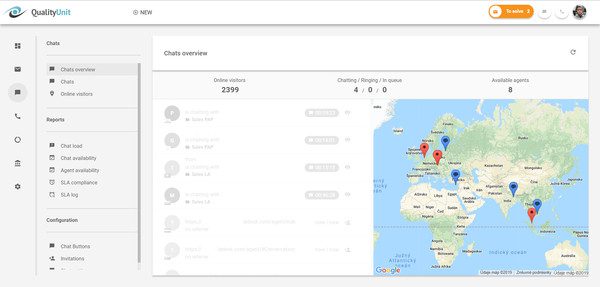
Behavioral insights
Behavioral insights analyze customer interactions with a brand. This analysis includes purchase history, website browsing, and social media engagement. These insights are crucial for identifying patterns that can guide product development and marketing strategies.
Businesses use metrics like page views, click-through rates, and purchase data to understand customer behavior. Observing these interactions across websites, apps, and digital channels lets companies fine-tune their approaches to enhance performance.
Here’s how behavioral insights are gathered and utilized:
- Data sources: Purchase history, website analytics, social media
- Metrics monitored: Page views, click-through rates, engagement
- Purpose: Identify patterns and improve customer journey
Implementing customer insight tools alongside marketing analytics tracking enables businesses to collect detailed data on customer behavior. This comprehensive view highlights areas of success and friction in customer journeys.
Attitudinal insights
Attitudinal insights delve into customers’ attitudes, beliefs, and opinions. Unlike behavioral data, which focuses on actions, these insights arise from verbal expressions like social media posts, surveys, and product reviews. Such data provides valuable feedback on customer sentiments.
Analyzing attitudinal insights helps businesses align their products and marketing strategies with customer expectations. These insights reveal trends in customer attitudes over time, aiding in informed decision-making.
Key aspects of attitudinal insights include:
- Sources: Social media, surveys, product reviews
- Focus areas: Opinions, beliefs, customer sentiments
- Benefit: Aligning strategies with customer expectations
By understanding how customers feel about a product or brand, businesses can enhance customer satisfaction and loyalty. Attitudinal insights thus offer a deeper understanding of customer experiences, contributing to business growth.
Practical examples of customer insights
One practical example is analyzing customer service data. By examining inquiries and complaints, companies can identify critical areas for improvement in product and service quality. Tools like CRM systems, such as Salesforce or LiveAgent, categorize interactions, helping businesses track patterns and enhance customer journeys.
Sales data is another crucial source. Metrics like transaction history, order frequency, and average order value offer valuable insights into purchasing behavior. This data aids in tailoring marketing efforts and product development to meet customer needs.
Market research reports from firms like Nielsen or Gartner provide broad market intelligence, complementing primary research. These reports help businesses stay informed about market trends and target audience preferences.
For managing customer questions and problems efficiently, LiveAgent stands out as an excellent tool. It enables businesses to gain deeper insights and deliver personalized customer experiences, thus increasing customer loyalty and retention.
Here’s a quick list of key areas to gather customer insights:
- Customer service data
- Sales data
- Market research reports
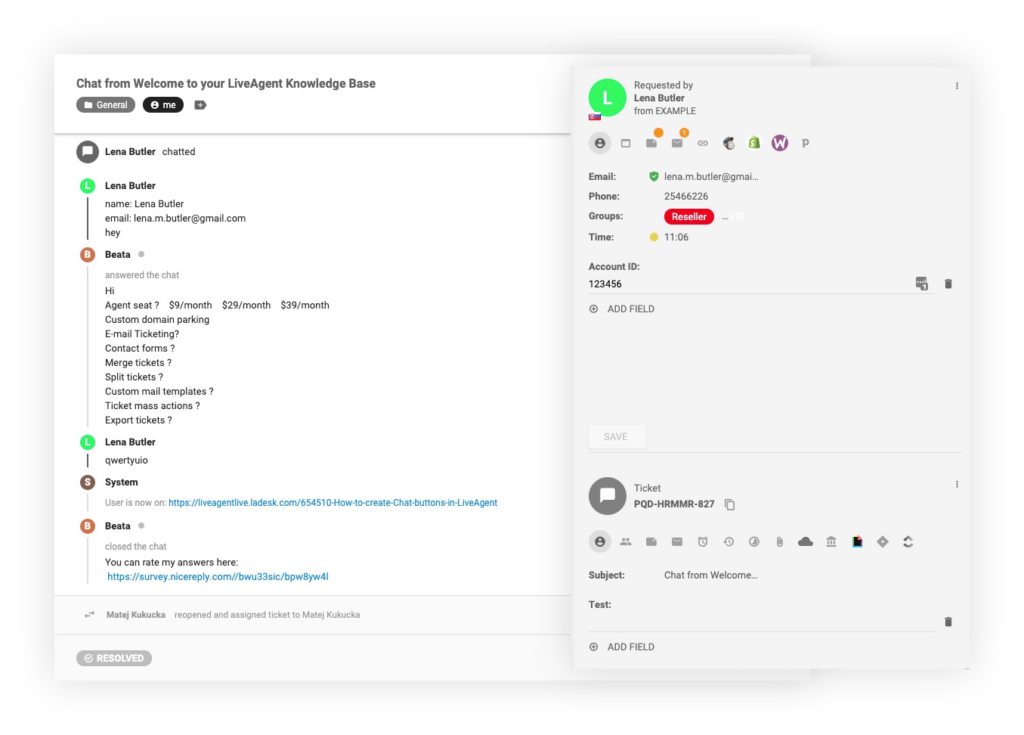
How to Gather Customer Insights
Companies can collect consumer insights through various channels, such as online reviews, customer surveys, social media comments, forum posts, and focus groups. This helps them better understand customer opinions and experiences. Aligning data collection efforts with specific goals, like improving customer retention or launching new products, ensures that insights are actionable and relevant. Ongoing analysis of customer service data, including questions and complaints, can reveal valuable insights about product and service quality.
Tracking customer purchase history helps identify popular products, understand seasonal trends, and tailor marketing campaigns to specific customer segments. Combining consumer insights with data from other sources, such as feedback surveys and market research, allows brands to gain a comprehensive understanding of consumer needs and preferences.
Utilizing feedback surveys
Feedback surveys are an effective tool for gathering customer insights. To maximize responses and ensure a substantial data pool, these surveys should be short and concise. They provide valuable information about the purchasing process and product satisfaction. Analyzing survey results using a knowledge management platform helps uncover insights and identify trends effectively.

Feedback surveys can take various forms, including numbered questionnaires and short answer sections for open-ended feedback. The timing of feedback collection, such as post-purchase or through in-context pop-up surveys, is crucial for obtaining relevant customer insights. Regularly conducting these surveys keeps businesses informed and responsive to customer needs.
Leveraging social media interactions
Leveraging social media interactions provides unique insights into customer behavior. Through interactive campaigns and user-generated content initiatives, businesses can foster a sense of community around their brand. By monitoring social media sentiment and purchase data in real-time, companies can address negative feedback swiftly and improve product quality based on customer concerns.
Utilizing social media analytics helps businesses understand the impact of their content and build valuable connections with the right consumers. These insights guide content creation, ensuring engagement and saving time and money. Integrating insights with social media analytics creates a seamless, data-driven approach that enhances the overall customer journey.
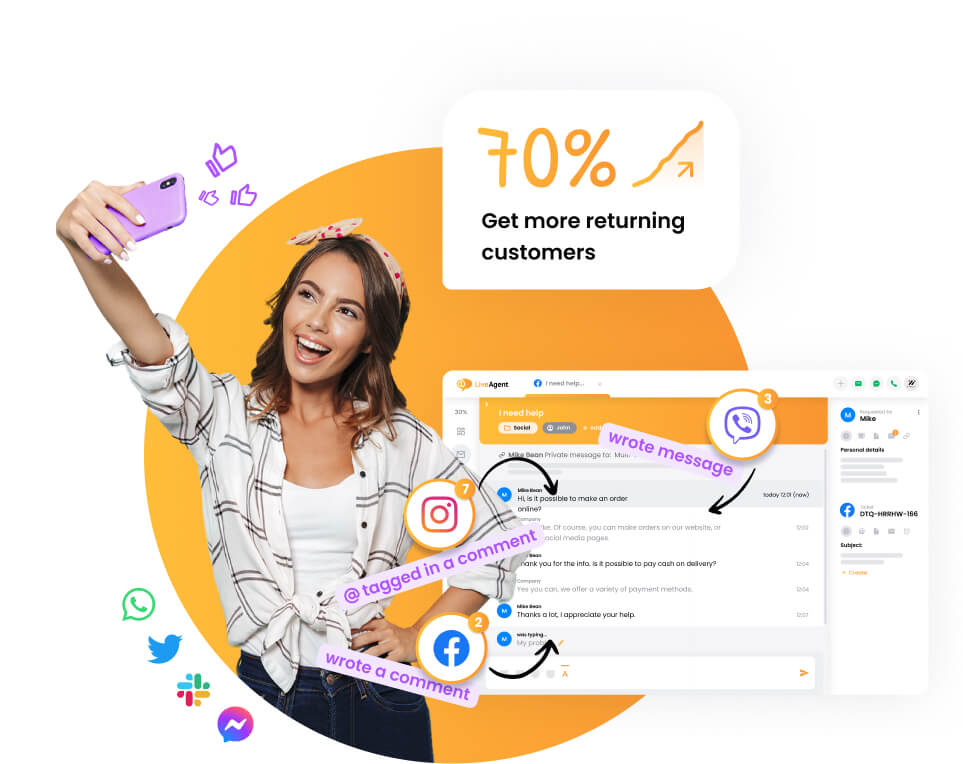
Analyzing market research data
Market research involves systematically gathering, recording, and analyzing data about customers, competitors, and the market using surveys, interviews, and observations. This research helps businesses identify market gaps, gauge product demand, and better understand their target demographic. Market research collects raw data on consumer behaviors and preferences, providing fundamental information for decision-making.
This data offers a high-level view of a consumer population and is used to identify new markets and develop future products. The market research industry is substantial, valued at an estimated $73.4 billion, and often relies on dedicated firms to conduct research and studies on behalf of companies. These insights, when combined with tools like LiveAgent, support personalized customer experiences that boost loyalty and retention.
Effective use of customer insights
Customer insights are interpretations of customer behaviors, needs, and preferences that reveal valuable intelligence about interactions and experiences. Engaging with customers directly through focus groups and interviews provides actionable insights and builds trust. By prioritizing insights based on their ease of implementation and potential impact, businesses can make data-driven decisions effectively. These insights also help identify warning signs of customer churn, enabling proactive retention strategies. Analyzing customer behavior can increase customer lifetime value by encouraging lasting relationships and repeat engagements.
Personalizing marketing efforts
Personalized marketing relies on customer insights to tailor strategies that engage consumers effectively. By understanding their favorite products and preferences, businesses can enhance brand loyalty and customer lifetime value. Using insights, companies can craft targeted product development and marketing strategies for specific segments. This not only increases customer satisfaction but also makes ad targeting more relevant and engaging. Successful companies like Spotify and Netflix use insights to align their services with individual preferences, ensuring personalized customer interactions.
Enhancing customer journeys
Customer insights can identify gaps in the customer journey, guiding improvements in product offerings and marketing strategies. By mapping customer journeys based on insights, businesses gain a competitive advantage and stay responsive to evolving needs. Continuous insight collection ensures informed decisions that positively impact the customer experience. By consistently exceeding expectations, businesses enhance customer satisfaction and loyalty.
Boosting customer retention
Insights focused on metrics like customer satisfaction scores, churn rates, and repeat purchases are crucial for retention. Surveys post-purchase or after service interactions provide real-time feedback, highlighting consumer pain points. Tracking behaviors and trends helps maintain high retention levels. Personalized insights address the varying needs of different segments, enhancing satisfaction and loyalty. Predictive analytics anticipates customer needs, strengthening loyalty by addressing demands ahead of time.
Informing product development
Customer insights offer a deeper understanding of customer behavior, informing product development and marketing strategies. By analyzing patterns from purchase history and browsing behavior, businesses can develop new products tailored to customers’ wants and needs. Feedback collection helps in identifying popular features and areas for improvement. Surveys post-transaction can yield valuable data that guides future product enhancements.
Leverage customer insights for growth
Understand your customers better and make data-driven decisions. Use powerful insights to enhance experiences, boost retention, and drive business success.
Tools and technologies for collecting insights
To gain valuable customer insights, businesses can use various tools and technologies. CRM systems like Salesforce and Liveagent help track and categorize customer inquiries and complaints. This provides insights into product and service quality. Predictive analytical solutions in CPG data analytics collect data about products, suppliers, and customer behaviors, offering actionable insights for informed decision-making.
Brands can also combine consumer insights from feedback surveys and market research with other data sources. This helps them understand consumer needs, preferences, and behaviors better. Additionally, customer insights can enhance digital marketing strategies. By personalizing campaigns, businesses can tailor their messaging, timing, and channels to align with customer preferences.
Integrating insights with platforms like email marketing tools or social media analytics improves the customer journey. This data-driven approach gives a deeper understanding of customer behavior. Here’s a short list of tools:
- CRM Systems (e.g., LiveAgent, Salesforce)
- Predictive Analytical Solutions
- Feedback Surveys
- Market Research Platforms
- Email Marketing Tools
- Social Media Analytics
For handling customer inquiries efficiently and gaining valuable insights, LiveAgent is an exceptional choice that helps address customer questions and problems effectively.
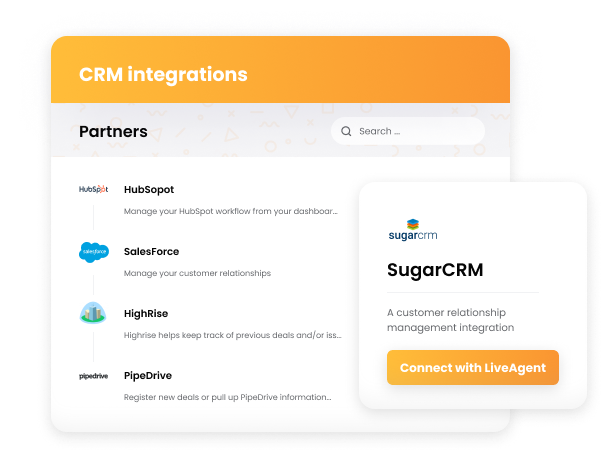
Challenges in gathering customer insights
Gathering customer insights is crucial but challenging. It’s an ongoing process requiring continuous listening and adapting to customer needs. One major challenge is using feedback effectively. This demands thorough analysis of data sources and customer sentiments.
The distinction between customer insights and market research adds complexity. Businesses need to interpret raw data to uncover motivations and trends, rather than just collecting information. Setting clear goals and understanding data quality are critical for successful insights gathering.
Developing an action plan from consumer data analysis poses another challenge. It involves cross-department collaboration and effective communication. This requires sharing findings and its implementation across the business.
Key challenges in gathering customer insights:
- Continuous Listening to Customers
- Analyzing Diverse Data Sources
- Interpreting Raw Data Accurately
- Setting Clear Goals and Data Quality
- Cross-Department Collaboration
To effectively manage these challenges, companies can use solutions like LiveAgent, which helps in addressing customer questions and problems swiftly. By doing so, businesses can gain actionable insights, enhancing customer satisfaction and driving growth.
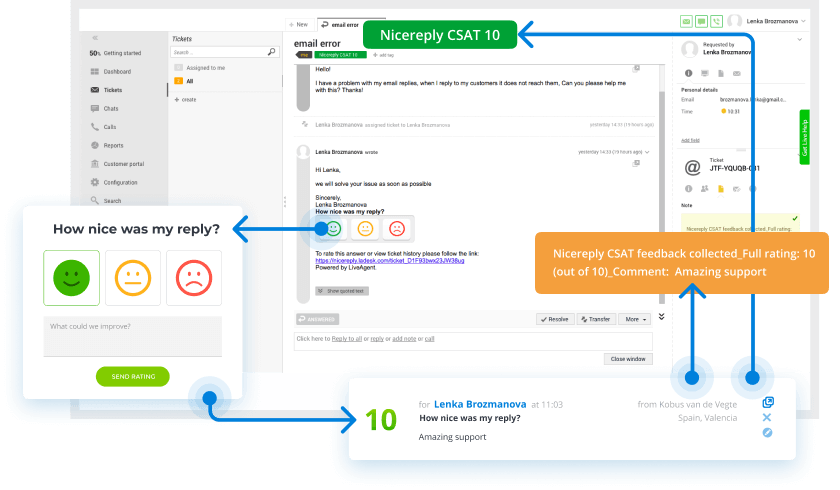
Best Practices for Implementing Customer Insights Strategies
Implementing effective customer insights strategies is key to engaging with target audiences and enhancing customer satisfaction. To begin, businesses should focus on gathering data through customer surveys, social media platforms, and product reviews.
- Data collection: Continuously feed new data into your customer insights program to make informed decisions about product offerings and marketing strategy.
- Prioritize insights: Prioritize insights based on ease of implementation and potential impact. This approach can lead to quick improvements in the customer experience.
- Engage directly: Use focus groups and interviews to gather actionable data. This not only provides valuable insights but also builds trust and strengthens customer relationships.
- Leverage technology: Utilize Customer Data Platforms to organize and analyze data effectively.
- Iterate often: Regularly update and refine strategies to adapt to changing market trends.
Utilizing these best practices, businesses can connect with customers more deeply, enhancing brand loyalty and ensuring customer retention. For resolving customer questions and fostering better experiences, consider using LiveAgent as a powerful tool to streamline communications.
Leverage customer insights for growth
Understand your customers better and make data-driven decisions. Use powerful insights to enhance experiences, boost retention, and drive business success.
Conclusion
Customer insights are crucial for understanding customer behavior, needs, and preferences. By collecting and analyzing both quantitative and qualitative data, businesses gain valuable insights to tailor their products and marketing strategies. This ensures alignment with customer expectations, boosting satisfaction and loyalty.
Advancements in big data and AI have transformed how businesses gather and use these insights. With real-time analysis, companies can now offer hyper-personalized customer experiences. Tools like LiveAgent play a pivotal role in this process by efficiently handling customer questions and problems.
To better grasp such insights, businesses can benefit from surveys, focus groups, and feedback analysis. This approach helps develop informed strategies that foster customer loyalty and drive business growth.
For those eager to experience the power of customer insights, LiveAgent offers a 30-day free trial. It’s a fantastic opportunity to see how understanding your customers can enhance your business’s performance.
Embrace customer insights today to build a stronger, more responsive business strategy.
Share this article
Smart customer satisfaction software
Boost customer satisfaction in 2025 with LiveAgent! Deliver personalized, 24/7 support on every channel. Free trial, no credit card needed.
Understanding customer retention: Definition, importance, and strategies
Master customer retention with 13 proven strategies, key metrics, and real examples. Boost loyalty, profits, and brand reputation today!

 Български
Български  Čeština
Čeština  Dansk
Dansk  Deutsch
Deutsch  Eesti
Eesti  Español
Español  Français
Français  Ελληνικα
Ελληνικα  Hrvatski
Hrvatski  Italiano
Italiano  Latviešu
Latviešu  Lietuviškai
Lietuviškai  Magyar
Magyar  Nederlands
Nederlands  Norsk bokmål
Norsk bokmål  Polski
Polski  Română
Română  Русский
Русский  Slovenčina
Slovenčina  Slovenščina
Slovenščina  简体中文
简体中文  Tagalog
Tagalog  Tiếng Việt
Tiếng Việt  العربية
العربية  Português
Português 